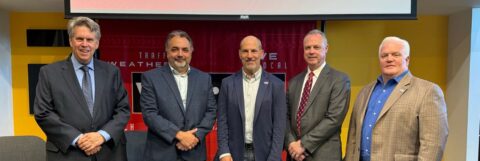
On May 8, MichAuto Executive Director Glenn Stevens Jr. joined WWJ Newsradio 950 at Automation Alley for its Tariffs and Trade: Navigating the Impact program to discuss how trade policy is impacting the automotive industry. Telemetry Auto’s Sam Abuelsamid, Motor and Equipment Manufacturers Association’s (MEMA) Steve Horaney, and Szott Auto Dealer’s Todd Szott also provided valuable insight during the event.
Since Jan. 20, 2025, when the America First trade policy was issued, the majority of workers in the automotive industry, from automakers to suppliers to dealerships, felt uncertainty. This extended to consumers as well.
“We were not surprised what was in [the trade plan], but surprised by the velocity and magnitude of what we’ve seen,” said Stevens.
Fluctuating tariffs and trade policy have caused carmakers to assess — and reassess — how to optimize their production for greater efficiency. One shift that plants have adopted has been “moving towards flexible manufacturing and using automated guided vehicles, allowing plants to do different things and build different kinds of products,” according to Abuelsamid.
From a dealer’s perspective, Szott highlighted that vehicle prices are expected to gradually increase by $1,000 to $2,000. In addition, if the supply chain becomes disrupted due to tariffs, the industry may again face a chip shortage. As a result, customers who want to buy a car may struggle to find the vehicle they desire.
Specifically for suppliers, Horaney provided insight into the EV innovation in the industry. Tariffs may also impede the shipment of critical components for EVs, stifling their production, development, and the capital and investments required to do so.
The tariff issue is a complex one that’s impact cannot be overstated.
“No one should argue that more manufacturing isn’t good for America. It’s the methodology of how we get there” said Stevens. “I do think you have to go deep into what makes the President’s mind tick, and that is the art of the deal … I do think that we will wind up with a stronger trade block.”

